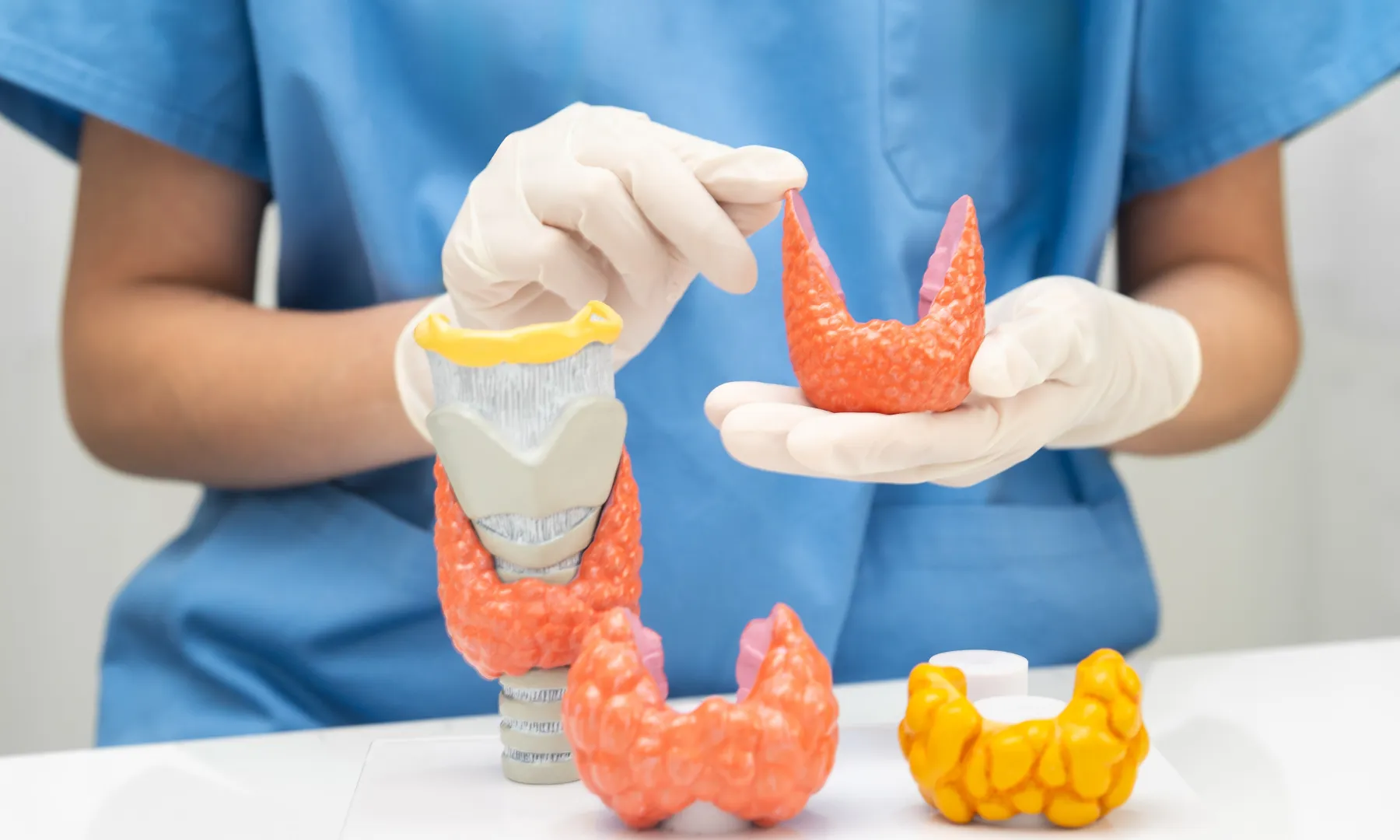
You’ve seen it before: the thyroid panels look “normal,” yet your patient feels anything but. Fatigue drags on, weight won’t budge, and that constant chill refuses to lift. The labs say “fine,” but your clinical intuition says otherwise. This is where nutrigenomics thyroid functional medicine transforms frustration into precision, giving practitioners a molecular lens to see what routine markers miss.
By uncovering how genetic variants shape thyroid hormone metabolism, detox pathways, and micronutrient utilization, you unlock a new layer of clinical applications. No more cookie-cutter iodine or selenium plans; we’re talking about nutrient protocols informed by DIO2, TPO, and HLA polymorphisms that determine how your patient’s thyroid truly functions at a cellular level.
This isn’t another abstract lecture in genetics; it’s a practitioner’s field manual for decoding thyroid-related SNPs, translating them into actionable nutrition and lab insights, and applying them where it counts. Grab your coffee (or your methylated B-complex), and let’s explore how the next era of thyroid care is being rewritten.
Key Takeaways
Nutrigenomics combined with functional medicine enables truly personalized thyroid care by tailoring nutrition and supplementation to individual genetic variants.
Specific genes like DIO2, DIO1, TPO, and HLA influence thyroid hormone metabolism and autoimmune risk, making genetic testing valuable for precise interventions.
Micronutrients such as selenium, iodine, iron, zinc, and vitamin A should be adjusted based on a patient’s genetic makeup for optimal thyroid function.
Careful integration of functional labs with genomic data helps identify hidden thyroid dysfunction missed by standard panels.
Automated tools and protocols streamline the implementation of nutrigenomics thyroid strategies in clinical practice, enhancing patient outcomes.
Professional training and certification support practitioners in mastering thyroid functional nutrigenomics for better personalization and results.
Table of Contents
Understanding Thyroid Function Through the Lens of Nutrigenomics
Let’s start with a familiar scene: a patient, low energy, weight gain, maybe a little “brain fog.” You run thyroid labs (TSH, T4, maybe T3 if you’re fancy). Standard approaches read black and white, either the person is hypothyroid or not. But you and I know the color is often in the gray.
Here’s where nutrigenomics muscles in with a fresh perspective. Think of the thyroid axis (TRH → TSH → T4/T3) as a master conductor, but each gene and micronutrient is an instrument subtly shifting the music. Some play smoothly, others hit a sour note, especially when a patient’s molecular mechanisms (like a DIO2 Thr92Ala SNP) mess with their vitamin metabolism or hormone conversion efficiency.
In practice, functional thyroid genomics is like adjusting the focus on a microscope. You’re not just catching big-picture dysfunction: you’re zooming in on personalized thyroid nutrition needs, exploring how selenium, iodine, iron, and vitamin A requirements shift based on individual thyroid metabolism SNPs. It’s a paradigm shift, one that explains why identical TSH scores don’t mean similar patient experiences.

Key Thyroid Genes and Their Roles
DIO2 & DIO1 – Conversion of T4 → T3
Ever have a patient whose TSH and T4 look perfect, yet every cell in their body is waving a little white flag? This is where DIO2 & DIO1 step into the spotlight. They’re the enzymes pulling off the magic trick of converting storage thyroid hormone (T4) into the active T3 that actually gets the job done.
Some folks are carrying the infamous DIO2 Thr92Ala variant, about 12% of people, give or take. What does it mean? Lowered conversion efficiency. You might see normal labs but hear stories of sluggishness, mood dips, or that never-warm core.
Here’s a real-world example: I had a mid-40s patient, let’s call her Grace, whose TSH danced right in the middle of the range, but her fT3 was chronically low-normal, with subpar energy no matter what we tweaked. Turned out she was heterozygous for DIO2 Thr92Ala. Instead of cranking up the thyroid hormone, we boosted selenium, iodine, and even a little extra tyrosine. Within a few months, her fT3 crept upward, and so did her good mornings.
TPO and HLA Variants – Autoimmune Susceptibility
Here’s where things get spicy. TPO (thyroid peroxidase) is a key architect in the hormone-building process. But sometimes, a patient’s immune system marks TPO as public enemy number one, producing TPO antibodies, leading to autoimmune thyroiditis. Now, toss in specific HLA genetic variants (like DR3 or DR5), and suddenly, susceptibility to autoimmunity shoots up like a weed after a spring rain.
How do practitioners meet this challenge? By thinking in the language of tolerance modulation, supporting vitamin D, glutathione, and omega-3 status to calm those molecular fires. And believe me, if you’ve ever seen oxidative stress fuel the fire of TPO antibody generation, you’ll know why nutrients that double as cellular firefighters are non-negotiable.
Nutrient Response by Genotype
Selenium, Iodine, Iron, Vitamin A, and Zinc Requirements
Not all nutrients play nice with everybody. The plot twist? Your patient’s genetic background might mean the difference between selenium acting as a superhero or a no-show. People with certain DIO1 or DIO2 variants have a bigger need for that trace mineral, especially for activating those deiodinase enzymes working behind the scenes.
Selenium (200 mcg of selenomethionine, organic and easy on absorption) helps clear oxidative stress and bump up DIO activity. But without retinol (thanks, BCMO1 SNPs) or enough iron (watch out for low ferritin), the show can still fall flat. Ever had a well-meaning practitioner raise a patient’s iodine without checking iron status? Hello, expensive headaches. (Also, potential thyroid flares.)
Zinc rounds out the list, think 15–30 mg daily, as a sidekick to TRH/TSH regulation. Bonus: If someone’s dealing with SLC39A8 SNPs, that daily zinc dose isn’t optional. And Vitamin A? Some BCMO1 variants make converting beta-carotene to active retinol as productive as running up a down escalator; direct retinol is the ticket for these folks.
Avoiding Excess Iodine in Sensitive Variants
It’s tempting to reach for iodine at the first sign of thyroid sluggishness, but if your patient carries TPO antibodies or HLA variants that love to stir up autoimmune trouble, adding excess iodine is like tossing gasoline on a slow burn. Trust me, it’s a rookie mistake even veteran practitioners make in the heat of a puzzling thyroid case.
What works? Prioritize bringing up selenium levels first, then, if the coast is clear (low or stable TgAb/TPOAb, urinary iodine in range), cautiously reintroduce iodine. Monitor, rinse, repeat. The result? You avoid flare-ups, spare your patient a rollercoaster ride, and manage to keep the phrase “too much of a good thing” in the rearview.
Integrating Functional Labs with Genomic Data
Using Antibodies and fT3/fT4 Ratios with Genetic Context
Let’s be honest: without a lab context, genomics is just a bunch of pretty letters strung together. Functional medicine is about marrying the molecular with the tangible, so get cozy with antibody tests (TPOAb, TgAb), fT3/fT4 ratios, and even reverse T3.
Say your patient has a DIO2 variant, don’t just nod knowingly: map it against their fT3:fT4 ratio. A low ratio means poor conversion, hinting toward a need for focused micronutrient support (think selenium, zinc), adaptogens, or even T3-preferring hormone support. If TPO/HLA variants join the party, rising antibody titers spell an autoimmune tilt, and your clinical radar should start scanning for oxidative stress markers and dialing in on tolerance-building nutrients.
Picture this process like a flight check: genotype → lab trends → nutrient adjustments → re-test. The workflow sounds futuristic, but with the right tools (and a nudge of curiosity), it quickly becomes second nature.

Case Example: DIO2 Variant + Subclinical Hypothyroid Pattern
Let’s crack open a real case, the kind of story that sticks. Jane (not her real name), forty-two, walks in with unshakable fatigue. TSH? In the green. fT4? Normal. But fT3 hovers at the bottom of normal, and reverse T3 is just above where you’d like.
A quick genetics panel flags DIO2 Thr92Ala heterozygosity. Instead of tossing more Synthroid into the mix, we put Jane on selenium (200 mcg selenomethionine), zinc (20 mg), and some gentle adaptogen blends. We rechecked labs eight weeks later, her fT3 bumped up, the ratio improved, and (perhaps most importantly) Jane said she didn’t have to haul herself out of bed anymore.
Why does this matter? Because you probably have 10 “Janes” in your practice right now, who look fine on paper but feel like they’re sleepwalking through life. Once you start mapping the molecular mechanisms and adjusting vitamin metabolism at the root, shifts happen fast. That’s the payoff of functional thyroid genomics in the trenches.
Implementation Workflow for Clinics
Practitioner Protocol Framework
Ready to roll this out in practice? Here’s a quick cheat sheet.
First, order a genomic panel focused on thyroid-relevant SNPs: DIO1, DIO2, TPO, HLA, BCMO1, SLC39A8, HFE, and TMPRSS6. Map what you find to the nutrient dependencies: selenium, iodine, iron, vitamin A (retinol), and zinc. Layer in functional labs: TSH, fT4, fT3, antibodies, reverse T3, oxidative stress. Now, precision is the name of the game; supplement plans should reflect exactly what your patient’s biochemistry and genes say they need (not what the latest wellness influencer recommends).
Track progress with practical metrics: conversion ratio shifts, indicator logs, antibody trends, not just lab numbers, but how the person feels. Document everything in your EHR, so protocols are reproducible, not reinvented every time.
Automation and Reporting
Most of us aren’t fond of extra paperwork. This is where automation tools (such as PureGenomics®) step in. Imagine templates that autopopulate personalized supplement suggestions when a particular variant is flagged. Example: DIO2 Thr92Ala pops up? Your workflow triggers “Add selenium 200 mcg/day unless selenoprotein P >7 mg/L.”
These systems take the guesswork (and the excuse for error) out of the equation. Less chasing lab data, more time talking to patients or sipping that now-cold coffee in the break room.
Advancing Your Clinical Edge in Thyroid Genomics
If this deep dive into nutrigenomics thyroid functional medicine has sparked that familiar “I need to master this” feeling. It’s time to turn knowledge into practice through the Integrative Genomics Specialist Program by Elite Gene Labs.
This certification isn’t another passive course; it’s an immersive clinical training designed for practitioners who want to interpret genomic data, translate it into precise nutritional and functional protocols, and implement it confidently with patients. Inside the program, you’ll work hands-on with real genomic cases, guided frameworks, and integrative workflows that connect SNP analysis to nutrient metabolism, detoxification, inflammation, and endocrine health.
Completers don’t just leave with theory; they gain a structured clinical system that folds genomics into every patient consult. Along the way, you’ll learn how to interpret complex reports, identify actionable polymorphisms, and design evidence-informed interventions that optimize thyroid, metabolic, and overall cellular performance.
The Integrative Genomics Specialist Program was built for clinicians who want to stay at the forefront of personalized medicine, aligning cutting-edge genomic interpretation with functional lab insights. This program is your next step toward becoming the kind of practitioner who doesn’t guess at genetics but masters them in practice.
Frequently Asked Questions
What is nutrigenomics thyroid functional medicine?
Nutrigenomics thyroid functional medicine combines genetic insights with root-cause functional medicine approaches to personalize thyroid care. By understanding how genes influence thyroid metabolism and nutrient needs, practitioners can tailor nutrition and treatment plans for better individual outcomes.
How do gene variants like DIO2 Thr92Ala affect thyroid health?
The DIO2 Thr92Ala variant can reduce the conversion of T4 to the active thyroid hormone T3. This means some people might have normal thyroid labs but experience symptoms like fatigue or sluggish metabolism, requiring targeted nutrient support such as selenium and zinc.
Which nutrients are important for optimal thyroid function based on genetics?
Key nutrients for thyroid function influenced by genetics include selenium, iodine, iron, zinc, and vitamin A. Specific gene
How should iodine be used in patients with thyroid autoimmune conditions?
In patients with TPO antibodies or HLA variants associated with autoimmunity, excess iodine can trigger flares. It’s best to optimize selenium and monitor antibodies before cautiously reintroducing iodine, always personalizing based on labs and genetic risk.
Can nutrigenomics help if standard thyroid labs are normal but symptoms persist?
Yes, nutrigenomics can reveal genetic factors affecting thyroid hormone metabolism, even when traditional labs appear normal. Personalizing nutrition and supplementation based on genetic data can address lingering symptoms and improve thyroid-related well-being.
Is nutrigenomics thyroid functional medicine only for complex cases?
No, while it’s especially valuable for puzzling or persistent thyroid symptoms, nutrigenomics-informed functional medicine can benefit anyone seeking precision in thyroid health, from fatigue to autoimmunity prevention.
References:
Palha, J. A., Neumann, S., & Canani, L. H. (2017). DIO2 Thr92Ala reduces deiodinase-2 activity and serum-T3 levels in thyroid-deficient patients. The Journal of Clinical Endocrinology & Metabolism, 102(5), 1623–1630. https://doi.org/10.1210/jc.2016-4183
Tomer, Y. (2010). Genetic susceptibility to autoimmune thyroid disease. Trends in Endocrinology & Metabolism, 21(10), 563–570. https://pmc.ncbi.nlm.nih.gov/articles/PMC2949235/
Godlewska, M., & Lewiński, A. (2025). A comprehensive review of selenium as a key regulator in thyroid hormone metabolism and thyroid disorders. Biological Trace Element Research. Advance online publication. https://doi.org/10.1007/s12011-025-04653-7
Chen, W., Li, N., & Zhang, Y. (2022). Impact of iodine intake on the pathogenesis of autoimmune thyroid disease. Frontiers in Immunology, 13, Article 1084690. https://doi.org/10.3389/fimmu.2022.1084690
Park, J. H., Hogrebe, M., Gruneberg, M., DuChesne, I., Kühn, B. T., Buers, I., Heneghan, J., Staufner, C., Spiekerkoetter, U., & Marquardt, T. (2018). SLC39A8 deficiency: A disorder of manganese transport and glycosylation. American Journal of Human Genetics, 102(5), 860–867. https://doi.org/10.1016/j.ajhg.2018.03.014
Eftekhari, M. H., Sadeghi, F., Liu, J., & Esmaillzadeh, A. (2023). Relationship between iron deficiency and thyroid function: A systematic review and meta-analysis. Frontiers in Endocrinology, 14, Article 1277930. https://doi.org/10.3389/fendo.2023.1277930
Godlewska, M., & Lewiński, A. (2025). Advancing personalized nutrition through genetic nutritional insights in thyroid diseases. Nutrients, 17(13), Article 2166. https://doi.org/10.3390/nu17132166

